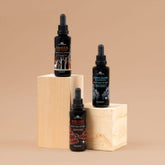
What Are Adaptogens? 5 Benefits of Rhodiola, The Golden Adaptogen
Mired in Myth
Rhodiola rosea is quite literally legendary. It was used by the ancient Greeks and the mythological Argonauts - rhodiola was probably Hercules’ supplement of choice. The vikings, the Mongols, and Chinese emperors are all rumored to have derived great power from rhodiola rosea.
Rhodiola has a pleasant aroma and a striking yellow flower. It’s an herb that grows in extremely harsh conditions - on the edges of cliffs just below the snow line. Just like we see in other holistic herbs like cordyceps, the ability to withstand such radical environments often correlates with the presence of a wealth of powerful compounds contained in the herb.
The Original "Adaptogen"
Rhodiola rosea got its name in 1725 from the famous Swedish botanist, Carl Linnaeus, who advocated its use for a number of ailments. Much of the early modern day research with Rhodiola was done by Cold War era Soviets. They were searching for an alternative to amphetamines, which proved to be very damaging to the body long-term.
In 1948 a man named Dr. Lazarev headed a team of researchers at the Siberian Academy of Sciences who were to find a more sustainable drug for the Soviets to replace amphetamines. They tested over 150 different herbal concoctions. During the process of testing and analyzing extracts they noticed that some of the extracts they created promoted “a state of nonspecific increased resistance”. From these observations, Lazarev first coined the now popular term “adaptogen” (1).
There are many different herbs which have been subsequently labeled adaptogens: 
Classifying Adaptogens
To gain the acclaimed title of adaptogen, an herb must meet some unique criteria:
- Nonspecific resistance. The herb must increase the body’s general resistance to different stressors including physical, chemical, and biological stressors. This includes regulating the body's stress response.
- Normalizing action. The herb must lead the body towards homeostasis if there are any imbalances in the organs, hormones, blood, etc.
- Innocuous effects. The herb’s use should be sustainable with no toxicity or other ability to cause physiological harm.
All of the herbs above have tremendous use as holistic adaptogenic supplements. But a particular wealth of different compounds have been identified within rhodiola rosea:

Here are five potential health benefits of rhodiola rosea:
1. Treatment of Depression. Depression is often very difficult to treat. Sometimes drugs can help, but the side effects can often be as debilitating as the depression itself. This study found that while the rhodiola rosea extract had less antidepressant effect compared to sertraline (Zoloft), it was better tolerated with significantly less side effects (2). Rhodiola may be have a better risk to benefit ratio for individuals suffering from mild to moderate depression. A main hardship for depression sufferers is a complete lack of energy and a drained feeling. Rhodiola might be able to help with this too.
2. Energy Production and Prevention of Fatigue. Working as an antioxidant, Rhodiola may protect the cells' mitochondria from damage, in turn leading to higher caliber energy production. Rhodiola may also increase ATP and CP (creatine phosphate) production (3), both of which lead to increased exercise performance (4).
3. Neurological and Brain Health. Neurological deterioration is behind some of the worst degenerative diseases like Parkinson's and Alzheimer's. Rhodiola's potent antioxidant effect may be neuroprotective and assist in repairing damages that eventually lead to degenerative diseases. Rhodiola may be able to help save injured neurons. In healthy individuals, rhodiola rosea could be a useful nootropic. In one study, rhodiola elicited significant improvements in cognitive functioning for a group of healthy physicians who were consistently on night shifts (5).
We are also learning that inflammation is correlated with neurological diseases. Rhodiola might have the ability to help control systemic inflammation and stave off the progression of some of these age-related diseases.
4. Fat Loss. This study linked rhodiola rosea extracts, namely the salidroside and rosavins contained in them, to lipolytic and anti-adipogenetic activity in humans (6). This means that rhodiola could help with both the breakdown of fat and the prevention of fat storage. Perhaps rhodiola could even be an accompaniment to a ketogenic diet if it continues to show promise in assisting with fat burning and counteracting fat storage.
5. Use as a SERM. A study showed that rhodiola could potentially help older women combat the adverse effects of menopause by acting as a SERM (selective estrogen receptor modulator) (7). It could lessen some of the deleterious effects of menopause like bone loss, psychological effects, and cardiovascular effects.
These are just five quick uses for rhodiola rosea. Its potential benefits actually span much wider.

The research has shown an impressive array of physiological actions and uses for rhodiola rosea. Adaptogens as a whole are a very interesting class of holistic herbal supplements. Their ability to optimize many different systems of the body can produce a strong network effect which supports overall wellness.
1. Brown, Richard P. M.D.; Gerbarg, Patricia L. M.D. "The Rhodiola Revolution: Transform Your Health with the Herbal Breakthrough of the 21st Century". Rodale, 2005. <https://books.google.com/books?id=krbHuJxEG1EC&printsec=frontcover&source=gbs_ge_summary_r&cad=0#v=onepage&q&f=false>
2. Mao JJ, Xie SX, Zee J, et al. Rhodiola rosea versus sertraline for major depressive disorder: A randomized placebo-controlled trial. Phytomedicine. 2015;22(3):394–399. doi:10.1016/j.phymed.2015.01.010
3. Abidov, M., Crendal, F., Grachev, S. et al. Effect of Extracts from Rhodiola Rosea and Rhodiola Crenulata (Crassulaceae) Roots on ATP Content in Mitochondria of Skeletal Muscles. Bulletin of Experimental Biology and Medicine (2003) 136: 585. https://doi.org/10.1023/B:BEBM.0000020211.24779.15
4. De Bock, K., Eijnde, B. O., Ramaekers, M., & Hespel, P. (2004). Acute Rhodiola Rosea Intake Can Improve Endurance Exercise Performance, International Journal of Sport Nutrition and Exercise Metabolism, 14(3), 298-307. https://journals.humankinetics.com/view/journals/ijsnem/14/3/article-p298.xml
5. Darbinyan V, Kteyan A, Panossian A, Gabrielian E, Wikman G, Wagner H. Rhodiola rosea in stress induced fatigue--a double blind cross-over study of a standardized extract SHR-5 with a repeated low-dose regimen on the mental performance of healthy physicians during night duty. Phytomedicine. 2000;7(5):365–371. doi:10.1016/S0944-7113(00)80055-0
6. Pomari E, Stefanon B, Colitti M. Effects of Two Different Rhodiola rosea Extracts on Primary Human Visceral Adipocytes. Molecules. 2015;20(5):8409–8428. Published 2015 May 11. doi:10.3390/molecules20058409
7. Gerbarg, P, Brown, R Pause menopause with Rhodiola rosea, a natural selective estrogen receptor modulator. Phytomedicine. 2016 Jun 15; 23(7): 763–769. Published online 2015 Dec 12. doi: 10.1016/j.phymed.2015.11.013



